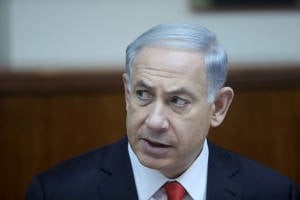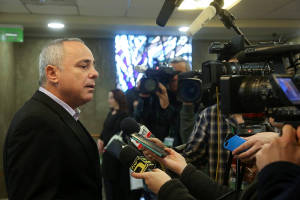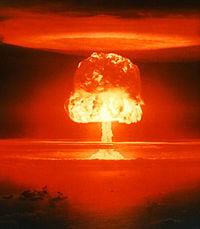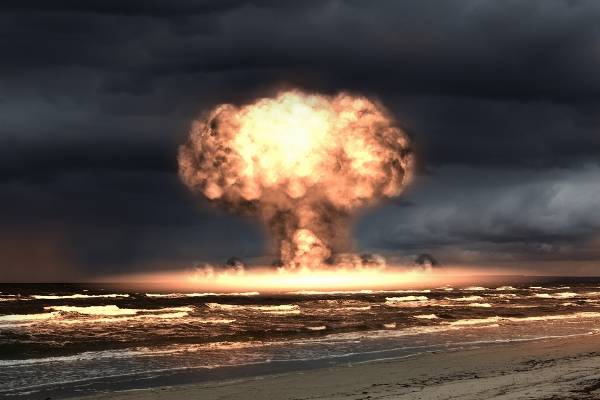Iran’s lack of disclosure regarding its nuclear program has raised suspicions that the Islamic Republic is indeed pursuing the bomb. Yet talks with the West continue.

PM Netanyahu leads weekly cabinet meeting in Jerusalem on Sunday. (Photo: Alex Zolomoisky/Flash90)
Iran has not addressed specific questions from the United Nations International Atomic Energy Agency (IAEA) regarding its nuclear ambitions, nor is it fully cooperating in two areas of the long-running investigation, a confidential IAEA report obtained by several media outlets reveals. This ambiguity feeds suspicions that Tehran’s nuclear activities are not of a peaceful nature, although Iranian officials claim otherwise.
Meanwhile, negotiations between Iran and the P5+1 are ongoing. Any deal would be purportedly based on Iran’s compliance with international inspections and openness regarding its nuclear program.
“Iran has not provided any explanations that enable the agency to clarify the outstanding practical measures,” the IAEA report states, referring to allegations of explosives tests and other activity indicating the development of nuclear bombs.
Diplomats representing the Six World Powers – the US, Britain, France, Germany, Russia and China – have voiced concern over the IAEA’s most recent report as well as earlier information, which detailed similar findings on Iran’s evasiveness.
“The IAEA report again notes that Iran is refusing to reveal to the world its preparations for the production of nuclear weapons. Iran insists on hiding this from the international community at a time when the major powers are continuing to try and allow Iran to produce the core of such weapons, enriched uranium. These do not go together,” Prime Minister Benjamin Netanyahu stated.
Netanyahu: ‘The Coming Month is Critical’
“It is astonishing that even after the recent IAEA report determined that Iran is continuing to hide the military components of its nuclear program, the nuclear talks are proceeding,” Netanyahu declared on Sunday morning at the weekly cabinet meeting. “Not only are they continuing, there is an increased effort to reach a nuclear agreement in the coming days and weeks. Therefore, the coming month is critical for the nuclear talks between Iran and the major powers because a framework agreement is liable to be signed that will allow Iran to develop the nuclear capabilities that threaten our existence. The agreement that is being formulated between Iran and the major powers is dangerous for Israel and therefore I will go to the US next week in order to explain to the American Congress, which could influence the fate of the agreement, why this agreement is dangerous for Israel, the region and the entire world.”
US Closing Gaps with Iran
Meanwhile, The Financial Times reports that world powers and Iran are making progress towards a nuclear deal.
“The gap is narrower than before” [on key areas], Yuval Steinitz, Israel’s strategic affairs minister, said in Munich, according to the Financial Times. “I can see progress on two or three central items.” Steinitz outlined four key areas of concern in the talks: the number of centrifuges Iran is permitted to continue operating; its stockpile of enriched uranium; its research into more advanced centrifuges; and the storage and dismantling of mothballed centrifuge arrays.

Minister of Intelligence Yuval Steinitz . (Photo: Marc Israel Sellem/Flash90)
“On the first issue of the number of centrifuges…there is some progress or gaps which have been narrowed. But this is mainly because the P5+1 made too many concessions,” Steinitz said. Tehran initially wanted a minimum of 9,000 centrifuges, and the P5+1 is considering 4,500 and possibly 6,000, the Times reports.
On its stockpile of uranium, Steinitz said, “There is some progress here also – the Iranians [are] agreeing to deliver most of the stockpile abroad.”
Israel’s chief remaining concern, on which there had been “no real progress,” is centrifuge research. Without a comprehensive ban, Iran could completely and legally undermine any deal, the Times states. Talks on the heavy water reactor at Arak are almost complete, and diplomats say that Iran is likely to accept a 15-year deal rather than the 10-year deal it had been seeking, the Times reports.
Western diplomats have expressed fear that the US, which has taken the lead in negotiations, will reach an agreement with Iran behind their backs. European diplomats fear that the Obama administration has accepted most of the Iranian demands regarding their nuclear aspirations in return for an assurance of regional calm and stability, Israel’s IDF Radio reported earlier in February.
By: United with Israel Staff
Sign the Petition to Stop a Nuclear Iran

The US Congress must ensure that sanctions against Iran remain in force until the nuclear threat is completely eliminated.
I strongly oppose easing sanctions before the nuclear threat from Iran has been eliminated. Allowing Iran to enrich uranium without being subject to 'anytime, anywhere' inspections is extremely dangerous and unacceptable. Iran's nuclear program must be stopped.
